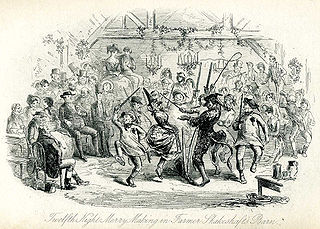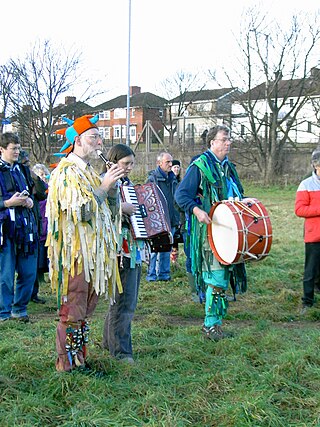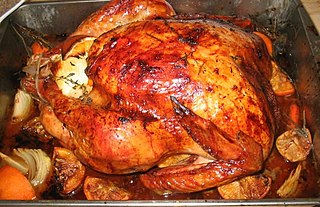
May Day is a European festival of ancient origins marking the beginning of summer, usually celebrated on 1 May, around halfway between the Northern Hemisphere's Spring equinox and June solstice. Festivities may also be held the night before, known as May Eve. Traditions often include gathering wildflowers and green branches, weaving floral garlands, crowning a May Queen, and setting up a Maypole, May Tree or May Bush, around which people dance and sing. Bonfires are also a major part of the festival in some regions. Regional varieties and related traditions include Walpurgis Night in central and northern Europe, the Gaelic festival Beltane, the Welsh festival Calan Mai, and May devotions to the Blessed Virgin Mary. It has also been associated with the ancient Roman festival Floralia.

Mulled wine, also known as spiced wine, is an alcoholic drink usually made with red wine, along with various mulling spices and sometimes raisins, served hot or warm. It is a traditional drink during winter, especially around Christmas. It is usually served at Christmas markets in Europe, primarily in Germany, the Czech Republic, Austria, Switzerland, Slovenia, Croatia, Hungary, Romania, the Nordic countries, the Baltic countries, Great Britain and eastern France. There are non-alcoholic versions of it. Vodka-spiked mulled wine can be found in Polish Christmas markets, where mulled wine is commonly used as a mixer.

The Mid-Autumn Festival is a harvest festival celebrated in Chinese culture. It is held on the 15th day of the 8th month of the Chinese lunisolar calendar with a full moon at night, corresponding to mid-September to early October of the Gregorian calendar. On this day, the Chinese believe that the moon is at its brightest and fullest size, coinciding with harvest time in the middle of autumn.

Apple cider is the name used in the United States and Canada for an unfiltered, unsweetened, non-alcoholic beverage made from apples. Though typically referred to simply as "cider" in North America, it is not to be confused with the alcoholic beverage known as cider in other places, which is called "hard cider" in the US. Outside of the United States and Canada, it is commonly referred to as cloudy apple juice to distinguish it from clearer, filtered apple juice and hard cider.
Bulmers cider is one of a number of brands owned by British cider maker H. P. Bulmer of Hereford, a Heineken subsidiary. It is one of the biggest selling British bottled cider brands in the UK with a number of variants including Bulmers Original & Pear. It should not be confused with Bulmers Irish Cider, sold outside the Republic of Ireland as Magners.

Twelfth Night is a Christian festival on the last night of the Twelve Days of Christmas, marking the coming of the Epiphany. Different traditions mark the date of Twelfth Night as either 5 January or 6 January, depending on whether the counting begins on Christmas Day or 26 December. January 6 is celebrated as the feast of Epiphany, which begins the Epiphanytide season.

Wassail is a beverage made from hot mulled cider, ale, or wine and spices, drunk traditionally as an integral part of wassailing, an ancient English Yuletide drinking ritual and salutation either involved in door-to-door charity-giving or used to ensure a good harvest the following year.

Cider apples are a group of apple cultivars grown for their use in the production of cider. Cider apples are distinguished from "cookers" and "eaters", or dessert apples, by their bitterness or dryness of flavour, qualities which make the fruit unpalatable but can be useful in cidermaking. Some apples are considered to occupy more than one category.

The tradition of wassailing falls into two distinct categories: the house-visiting wassail and the orchard-visiting wassail. The house-visiting wassail is the practice of people going door-to-door, singing and offering a drink from the wassail bowl in exchange for gifts; this practice still exists, but has largely been displaced by carol singing. The orchard-visiting wassail refers to the ancient custom of visiting orchards in cider-producing regions of England, reciting incantations and singing to the trees to promote a good harvest for the coming year. Notable traditional wassailing songs include "Here We Come a-Wassailing", "Gloucestershire Wassail", and "Gower Wassail".

Malus domestica is an English cultivar of apple that is usually eaten cooked due to its sourness. The variety comes from a pip planted by Mary Ann Brailsford. The Concise Household Encyclopedia states, "Some people eat this apple raw in order to cleanse the palate, but Bramley's seedling is essentially the fruit for tart, pie, or dumpling." Once cooked, however, it has a lighter flavour. A peculiarity of the variety is that when cooked it becomes golden and fluffy.
Common Ground is a United Kingdom charity and lobby group. Founded in 1982 by Susan Clifford and Angela King, Common Ground aims to promote "local distinctiveness".

Carhampton is a village and civil parish in Somerset, England, 4 miles (6.4 km) to the east of Minehead.

Whimple is a village and civil parish in East Devon in the English county of Devon, approximately 9 miles (14 km) due east of the city of Exeter, and 3 miles (4.8 km) from the nearest small town, Ottery St Mary. It has a population of 1,642, recounted to 1,173 for the village alone in the United Kingdom Census 2011. The electoral ward with the same name had a population of 2,380 at the above census.

A beer festival is an event at which a variety of beers are available for purchase. There may be a theme, for instance beers from a particular area, or a particular brewing style such as winter ales.

Christmas dinner is a meal traditionally eaten at Christmas. This meal can take place any time from the evening of Christmas Eve to the evening of Christmas Day itself. The meals are often particularly rich and substantial, in the tradition of the Christian feast day celebration, and form a significant part of gatherings held to celebrate the arrival of Christmastide. In many cases, there is a ritual element to the meal related to the religious celebration, such as the saying of grace.

The Apple Wassail or Orchard Wassail is a traditional form of wassailing practiced in the cider orchards of Southern England during the winter, on either Twelfth Night or Old Twelfth Night. There are many well recorded instances of the Apple Wassail in the early modern period. The first recorded mention was at Fordwich, Kent, in 1585, by which time groups of young men would go between orchards performing the rite for a reward. Among the most famous wassail ceremonies are those in Whimple, Devon and Carhampton, Somerset, both on Old Twelfth Night, 17 January. The practice was sometimes referred to as "howling".

A sagardotegi is a type of cider house found in the Basque Country where Basque cider and traditional foods such as cod omelettes are served. Modern sagardotegis can broadly be described as a cross between a steakhouse and a cider house.

Cider is an alcoholic beverage made from the fermented juice of apples. Cider is widely available in the United Kingdom and Ireland. The UK has the world's highest per capita consumption, as well as the largest cider-producing companies. Ciders from the South West of England are generally higher in alcoholic content. Cider is also popular in many Commonwealth countries, such as India, South Africa, Canada, Australia, New Zealand, and New England. As well as the UK and its former colonies, cider is popular in Portugal, France, northern Italy, and northern Spain. Germany also has its own types of cider with Rhineland-Palatinate and Hesse producing a particularly tart version known as Apfelwein. In the U.S. and Canada, varieties of alcoholic cider are often called hard cider to distinguish it from non-alcoholic apple cider or "sweet cider", also made from apples. In Canada, cider cannot contain less than 2.5% or over 13% absolute alcohol by volume.

Cider doughnuts or apple cider doughnuts are American cake doughnuts that get their flavor from cinnamon, nutmeg and apple cider used in the batter. They are a harvest tradition in autumn in the northeastern United States and are sometimes sold at cider mills. They are often paired with apple cider, and may be covered with cinnamon and/or granulated sugar.
Cider in the United Kingdom is widely available at pubs, off licences, and shops. It has been made in regions of the country where cider apples were grown since Roman times; in those regions it is intertwined with local culture, particularly in the West Country.

















